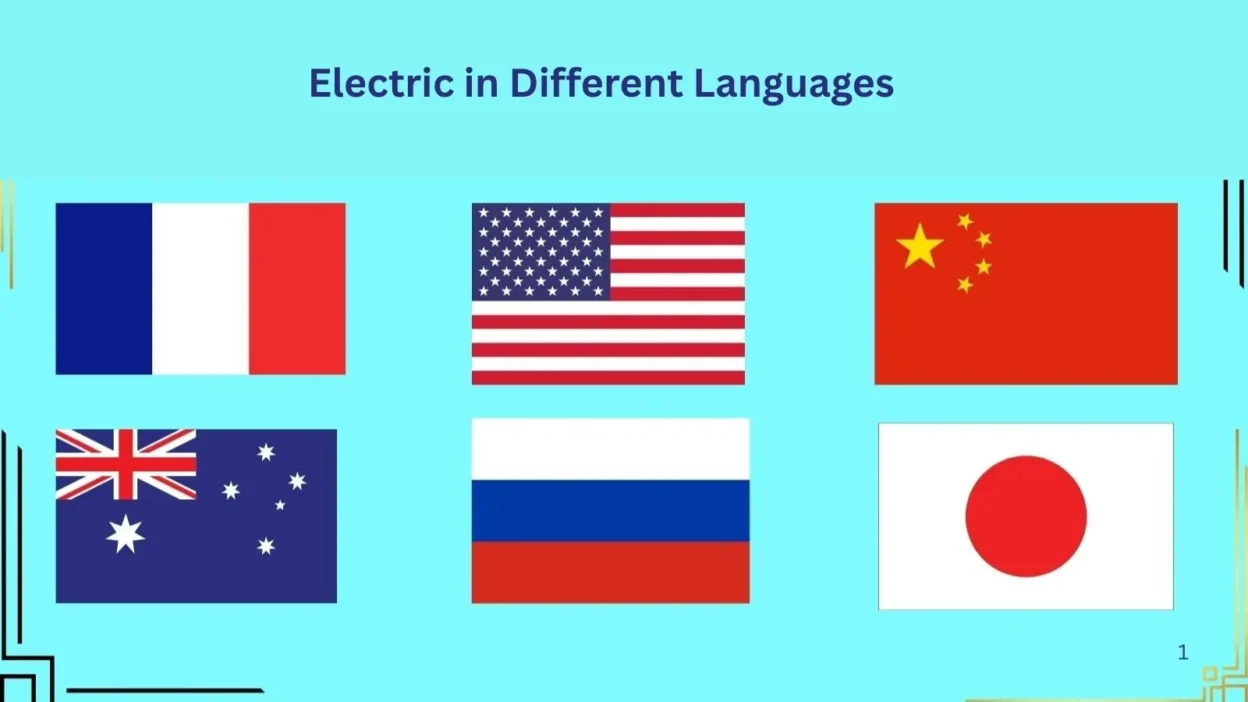Why You’re Searching for “Electric in Different Languages”
If you’ve landed on this page, chances are you’re trying to communicate something related to “electric”—whether it’s an electric appliance, electric vehicle, electric current, or simply the word itself—in another language.
You might be a traveler, a student, a translator, or someone doing business or shopping internationally.
Whatever the reason, you’re looking for the correct translation and meaning of the word electric, and how to use it appropriately in real-world situations.
This blog post is designed to solve that problem for you instantly. We’ll explain the meaning of “electric,” its uses, and provide translations in over 50 different languages with example sentences,
so you can confidently use the word in conversations, presentations, or writing—no matter where you are in the world.
What Does “Electric” Mean?
The word “electric” is an adjective used to describe something powered by or producing electricity. It can refer to:
- Devices: electric fan, electric car, electric stove
- Energy: electric current, electric charge
- Atmosphere/Emotion: The concert had an electric atmosphere.
Common Uses of “Electric”
- Devices/Appliances:
➤ I bought an electric kettle.
➤ This house has electric heating. - Vehicles:
➤ Tesla makes electric cars.
➤ She rides an electric bike. - Electricity/Science:
➤ Electric charge flows through the wire.
➤ Electric power is measured in watts. - Feelings or Atmosphere:
➤ The room was filled with electric excitement.
Why It’s Important to Know This Word in Other Languages
You might want to:
- Travel and ask for an electric plug, vehicle, or appliance.
- Translate product descriptions or manuals.
- Understand international tech news.
- Communicate with global partners or clients.
Now let’s explore the word “electric” in different languages.
Electric” in 50+ Languages (with Pronunciation Help)
| Language | Word for “Electric” | Pronunciation |
| Spanish | Eléctrico / Eléctrica | eh-LEHK-tree-koh |
| French | Électrique | ay-lek-TREEK |
| German | Elektrisch | eh-LEK-trish |
| Italian | Elettrico / Elettrica | eh-LET-tree-koh |
| Portuguese | Elétrico / Elétrica | eh-LEH-tree-koh |
| Russian | Электрический (elektricheskiy) | ee-lek-TREE-chees-kee |
| Chinese (Mandarin) | 电的 (diàn de) | dyen duh |
| Japanese | 電気の (denki no) | DEN-kee noh |
| Korean | 전기의 (jeongi-ui) | CHUN-gee wee |
| Arabic | كهربائي (kahrabaa’i) | kah-ra-BAA-ee |
| Hindi | विद्युत (vidyut) | VID-yut |
| Urdu | برقی (barqi) | BUR-kee |
| Greek | Ηλεκτρικός (ilektrikós) | ee-lek-tree-KOS |
| Turkish | Elektrik | eh-lek-TREEK |
| Dutch | Elektrisch | eh-LEK-trish |
| Polish | Elektryczny | eh-lek-TRIHCH-nee |
| Swedish | Elektrisk | eh-LEK-trisk |
| Romanian | Electric | eh-LEK-treek |
| Finnish | Sähköinen | SAH-hoi-nen |
| Hungarian | Elektromos | eh-lek-TROH-mosh |
| Thai | ไฟฟ้า (fai-fáa) | fai-FAH |
| Vietnamese | Điện | deen |
| Malay | Elektrik | eh-lek-TREEK |
| Indonesian | Listrik | LIS-trik |
| Swahili | Umeme | oo-MEH-meh |
| Bengali | বৈদ্যুতিক (boidyutik) | boy-DOO-tik |
| Tamil | மின்சாரம் (minchāram) | min-CHAAR-um |
| Punjabi | ਬਿਜਲੀ (bijli) | BIJ-lee |
| Ukrainian | Електричний (elektrychnyi) | eh-lek-TRIHCH-ny |
| Hebrew | חשמלי (khashmali) | khash-mah-LEE |
| Filipino | Elektriko | eh-lek-TREE-koh |
| Nepali | विद्युतीय (bidyutiy) | VID-yu-tee |
| Afrikaans | Elektries | eh-LEK-trees |
| Czech | Elektrický | eh-lek-TRIH-tskee |
| Slovak | Elektrický | eh-lek-TRIH-tskee |
| Danish | Elektrisk | eh-LEK-trisk |
| Norwegian | Elektrisk | eh-LEK-trisk |
| Serbian | Електрични (električni) | eh-lek-TREECH-nee |
| Croatian | Električni | eh-lek-TREECH-nee |
| Bulgarian | Електрически (elektricheski) | eh-lek-TREECH-es-kee |
| Persian (Farsi) | الکتریکی (elektriki) | el-ek-TREE-kee |
| Latvian | Elektrisks | eh-lek-TRIS-ks |
| Lithuanian | Elektrinis | eh-lek-TRI-nees |
| Estonian | Elektriline | eh-lek-TREE-lee-neh |
| Icelandic | Rafmagns | RAHV-magns |
| Sinhala | විදුලි (viduli) | VEE-doo-lee |
| Uzbek | Elektr | eh-LEK-ter |
| Kazakh | Электрлік (elektrlik) | eh-lek-TIR-leek |
| Azerbaijani | Elektrik | eh-lek-TREEK |
| Georgian | ელექტრო (elektro) | eh-LEK-tro |
How to Use These Translations in Real Life
Here are some examples of how to use the word electric in different languages:
- French: J’ai acheté une voiture électrique. (I bought an electric car.)
- Spanish: La estufa eléctrica está encendida. (The electric stove is on.)
- Hindi: यह एक विद्युत उपकरण है। (This is an electric device.)
- Chinese: 我需要一个电插头。 (I need an electric plug.)
Conclusion
Understanding the word “electric” in different languages not only helps in travel and communication, but also expands your cultural knowledge and supports global business or learning. Whether you’re talking about electric vehicles, electric power, or simply describing an electric vibe, now you can say it confidently in over 50 languages.
Quick Recap
- “Electric” means powered by electricity or producing it.
- Common uses include devices, vehicles, and describing energy or emotion.
- You’ve now learned how to say “electric” in more than 50 languages.
- Use this guide for travel, communication, business, or translation work.



